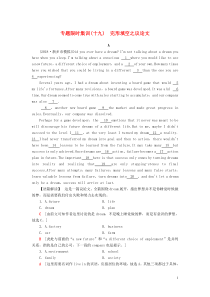 DOC
DOC
【文档说明】高考英语二轮复习专题限时集训19完形填空之议论文含解析.doc,共(8)页,68.000 KB,由MTyang资料小铺上传
转载请保留链接:https://www.ichengzhen.cn/view-74756.html
以下为本文档部分文字说明:
1专题限时集训(十九)完形填空之议论文A(2018·新乡市模拟)Didyoueverhaveadream?I'mnottalkingaboutadreamyouhavewhenyousleep.I'mtalkin
gaboutaconscious1whereyouwouldliketoseeanewfuture,adifferentchoiceofemployment,anda2ofyourown.Howmanytimeshaveyouwishedthatyoucouldbelivinginadiffere
nt3thantheoneyouare4experiencing?Severalyearsago,Ihadadreamaboutinventingaboardgamethatwould5mylife'sfortunes.Aftermanyrevisions,aboardg
amewasdeveloped.Itwasa(n)6time.Ourdreamseemedtocometruewithsalesstartingtoaccumulate,andourcompanywasalso7.8,anothernewboardgame9the
marketandmadegreatprogressinsales.Eventually,ourcompanywasdissolved.Perhapsforagamedeveloper,the10emotionstha
titneverwasmeanttobewilldiscouragehisfuturedreamsofadifferentlife.Buttome,maybeIdidn'tsucceedtothelevelI11,attheveryleastIturnedmydream12ar
eality.13Ihadnevertransferredmydreamintogoalandthentoaction,therewouldn'thavebeen14lessonstobelearnedfromthefailure.Itma
ytakemany15butsuccessisonlyachieved.Oncedreamsare16action,failurebecomesa17actionplaninfuture.Theimportant18hereisthatsu
ccessonlycomesbyturningdreamsintorealityandrealizingthat19areonlystepping-stonestofinalsuccess.Aftermanyattempts
,manyfailures,manylessonsandmanyfalsestarts,learnvaluablelessonsfromfailure,turndreamsinto20,anddon'tletadreamonlybeadr
eam,successwillarriveatlast.【语篇解读】这是一篇议论文。全篇围绕dream展开,指出梦想并不是你睡觉时候做的梦,而是需要我们付出失败和努力去实现的。1.A.futureB.lifeC.dreamD.planC[由前文可知
作者这里讨论的是dream,不是晚上睡觉做的梦,而是有意识的梦想,故选C。]2.A.factoryB.businessC.carD.farmB[此处与前面的“anewfuture”和“adifferentchoiceofemploymen
t”是并列关系,指的是自己的公司,下一段的company也是提示。]3.A.environmentB.schoolC.familyD.societyA[这里需要名词作livein的宾语,应指居住的环境,故选A。其他三项都过于具体,2没有普遍性。]4.A.enjo
yablyB.previouslyC.constantlyD.currentlyD[根据前文句意来说主要是强调现在的环境和所预想的环境相比较,故选D,意为“当前地”。]5.A.destroyB.realizeC.changeD.createC[前面提到了想要生活在截然不同的环境,暗指与
之前的不同,所以应该用改变,故选C。]6.A.excitingB.terribleC.darkD.embarrassingA[根据下句可知我们的梦想似乎要实现了,所以心情应是激动的,故选A。]7.A.canceledB.combinedC.disappear
edD.foundedD[既然我们的梦想似乎要实现了,那么我们的公司当然是成立了,故选D。]8.A.UnfortunatelyB.UnlikelyC.UnconsciouslyD.UnfairlyA[根据后面的“ourcompanywasdi
ssolved”可知是不幸的,故选A。]9.A.cameintoB.leftoutC.camebackD.tookinA[这里指有一家新的公司进入了市场,故选A。]10.A.optimisticB.negativeC.difficultD.positiveB[根据后面的描
述可知是一种不好的情绪,故选B,意为“消极的”。]11.A.neededB.devotedC.desiredD.beggedC[作者没有成功到达想要(desire)达到的那个水平。]12.A.byB.onC.overD.into
D[此处表示作者将目光从梦想转移到现实中来,故选D。]13.A.UnlessB.IfC.AfterD.BeforeB[由后面的“therewouldn'thavebeen...”可知前面是对过去时的一种虚拟语气,应该用if。]14.A.valuableB.success
fulC.uselessD.cruelA[这里的lessons是从失败中学到的,应是很有参考的价值,故选A。]15.A.analysesB.designsC.attemptsD.revisions3C[成功是需要付出很多努力的,故选C。]16.A.takenupB.lookedin
toC.runacrossD.putintoD[此处指把梦想付诸行动。put...intoaction把„„付诸行动。]17.A.goodB.betterC.mostD.badB[一旦梦想付诸于行动,失败就会变成更好的行为,因为它对梦想是有帮助的。
]18.A.meaningB.pointC.truthD.purposeB[根据后面的that从句可知,此处应是指的重点,故选B。]19.A.effortsB.achievementsC.possibilitiesD.difficultiesB
[这里强调最终的成功才是重点,而小成就(achievement)只是踏脚石,故选B。]20.A.heartB.existenceC.actionD.ambitionC[此处指把梦想付诸于行动,故选C。]B
Beforetheageofthetelegraphortelephone,letterwritingwasthemainwayofcommunication.However,ithasbeengradually21b
yotherwaysoverrecentyears.Technologyhasdevelopedso22thatwenowexpecttobeabletotalktopeopleimmediately—andgeta(n)23fromthemalmosts
traightaway.Ratherthanputtingpentopaper,formostofusitnowfeelsmuchmore24tosendtextsandemails,quicklytyp
ingoutourmessagewithinseconds.Ofcourse,thereare25tothesemodernwaysofcommunication.Weliveinafast-pacedworldandit'
simportantwe26.Wecanchattopeopleallovertheglobe,withinseconds!Wecanalsoeditouremailsbeforewe27them.However,ifwemadea(n)28inalette
r,we'dbeforcedtocrossitoutorstartagain.Butdoweeverthinkaboutwhatweare29?Byforgettingabouttheartoflet
terwriting,Ithinkwe'remissingout.Hugely.Idon'tknowasinglepersonwhowouldsaythattheydidn'tenjoy30aletterthroughthepost.
There'ssomethingveryspecialabout31thatsomeonehastakenthetimetowriteahand-written32foryou.Itdoesn'thavetobe
fullof33news—afterall,mostofouremailstofriendsarejustchattingaboutnormalthings,butitfeelsmuchmore34torecei
vejustoneletterthantoreceivehundredsoftextsand35.Andit'snotonlythepersonreceivingtheletterwhowill36alovelyenvelopeappearingthroughthei
rdoor.Letterwritingcanhelpthe37,too.Inasimilarwaytokeepingadiary,writingalettertoa38canbeveryrelaxing.39,whenweknowwe'redoingsomet
hingthatwillmakeafriendvery40,we4feelgoodourselves!【语篇解读】本文是议论文。手写书信相比现代沟通方式确实有不足之处,但它也有现代沟通方式所没有的好处。
21.A.removedB.replacedC.rejectedD.rememberedB[由第三段中的“Byforgettingabouttheartofletterwriting...”可知,手写书信被大家淡忘了,它已经逐渐被其他沟通方式“取代了(replaced)”。
]22.A.earlyB.steadilyC.slightlyD.rapidlyD[由本句话中的“beabletotalktopeopleimmediately”和“almoststraightaway”可知,科技发展得非常“迅速(rapidly)”,我们能够向他人发起即
时谈话,并得到即时“回应(response)”。]23.A.orderB.favourC.responseD.explanationC[参见上题解析。]24.A.convenientB.difficultC.interestingD.annoyingA[由下文“q
uicklytypingoutourmessagewithinseconds”可知,通过短信息和电子邮件,我们能快速打出文字内容,因此与用纸笔写信相比,发送短信和电子邮件更加“方便(convenient)”。]25.A.reasonsB.effectsC.requir
ementsD.advantagesD[由下文“Wecanchattopeopleallovertheglobe,withinseconds”以及“Wecanalsoeditouremails”可知,本段讲的是现代沟通方式的“优势(advantages)”。]26.A.keepup
B.cheerupC.growupD.showupA[由上文“Weliveinafast-pacedworld”可知,当今世界的节奏很快,因此我们需要“跟上(keepup)”。]27.A.openB.re
adC.signD.sendD[电子邮件的优势之一就是在“发送(send)”它们之前,我们可以编辑修改邮件内容;而写信时,如果写“错(mistake)”了,我们就不得不划掉或者重新再写一封。]28.A.excuseB.pictureC.mistakeD.promiseC[参见上题解析。]
29.A.lackingB.losingC.expectingD.learningB[下文missingout是提示。]30.A.changingB.copying5C.receivingD.droppingC[由下文可知,本段讨论了收到书信时的感受,且下一段中“
thepersonreceivingtheletter”是提示。]31.A.regrettingB.hopingC.guessingD.knowingD[“知道(knowing)”有人腾出时间给“你”写了一封手写“信(letter)
”,这感觉非常特殊,且上文aletter是提示。]32.A.cardB.letterC.bookD.reportB[参见上题解析。]33.A.importantB.goodC.freshD.funnyA[本空与下文normal形成对比,毕竟我们平时给朋友发的电子邮件里谈论的也都是些平常的事,因此书
信里也不必写满“重要的(important)”消息。]34.A.usefulB.commonC.personalD.simpleC[虽然书信的内容也可以是平常小事,但因为书信是手写的,收到小小的一封书信能让人感觉非常“私密(personal)”。]35.A.ema
ilsB.callsC.visitsD.giftsA[与上文oneletter相对应,收到数百的短信和“电子邮件(emails)”都不如收到一封书信给人的感觉好。]36.A.focusonB.pickupC.benefitfromD.askforC[上文讲的是收到书信给人带来的益处,此处作
者认为“受益于(benefitfrom)”书信的人不仅仅是收信人。下文的“Letterwritingcanhelp...too”也是提示。]37.A.ownerB.writerC.editorD.postmanB[由下文writingaletter可知,作者还讨论了书信
给“写信人(writer)”带来的好处。]38.A.friendB.strangerC.neighbourD.teacherA[下文afriend是提示。]39.A.HoweverB.ThereforeC.InsteadD.Bes
idesD[本空前面讲到写信让人放松,后面讲到我们写信时自己也感觉很好,因此前后讲的都是写信给写信人带来的好处,故选D项。]40.A.anxiousB.happyC.nervousD.clever6B[由上一段中的第一句
话“Idon'tknowasingleperson...letterthroughthepost”可知,人们收到信时很开心,因此我们写信时是在做让朋友“高兴(happy)”的事情。]CWhenyouliveinaseasonalenvironment,y
oucanlearnthatbothoutdoorandindooractivitieshavetheirplace.Astheseasons41,sodoesyourmood.Certainactivitiesbecomemoreorle
ssattractive,42theweatherandthelengthoftheday.Springisatimeoftheyearwhentheworldstartsto43fromitswintersleep.Durin
gthisseason,Ienjoygoingonlongwalksthroughparksandwatchingtheworldcome44.Manyconsidersummertobethetopofthe
year.Thecitycomesintofullswing45theweatherbecomeswarmerandwarmer.Duringthesummer,Iprefertospendthedaytimeanywherethatisair-conditioned.This46
includethelibrary,ashoppingcenteroramovietheater.Ioftenenjoyspendingthe47eveningssittingonthewidebalco
ny(阳台)ofmyhouseandhavingdrinkswithmyfriends.Fall,withthe48oftheleavesandthesummerheatgradually49,ispr
obablyanother50timetogoonlongwalksduringtheday.Ilovetobe51duringfallandseethelifeofthecityreturningtoitshibernation(冬眠).Another52togo
outsideduringautumnisto53thelastdaysofwarmthuntilthenextyear.Winter54theshorteningofdaysandcoolerweather.Outdooractivitiestendtobecomeless55andsin
kingdownonthesofawithagoodbookbecomesmy56activity.Itisnotenjoyabletospendtimeoutsideifitistoo57.IonlychoosetogooutsidewhenIw
anttogoskiing.So,my58tospendtimeindoorsoroutdoorsisvastlydependentonthe59.Differentseasons60differentactivitiesandthereforeitisimpossi
bletochoosewhetherIwouldspendallofmysparetimeindoorsoroutdoors.【语篇解读】本文是议论文。在室内活动好还是在室外活动好?作者谈了自己的观点。41.A.endB.changeC.beginD.arri
veB[四季“更迭(change)”会影响人们的心情。]42.A.resultinginB.consistingofC.referringtoD.dependingonD[由下文作者列举他在不同季节喜欢的活动不同可知,他认为某些活动变得更加有吸引力或者无吸引
力“取决于(dependingon)”天气以及白昼的长短。]43.A.shakeB.circleC.awakenD.waveC[由“fromitswintersleep”可知,春天是万物开始从冬眠中“醒
来(awaken)”的季节。作者喜欢在这个季节去公园散步并观察万物“复苏(comealive)”。]744.A.openB.aliveC.stillD.realB[参见上题解析。]45.A.asB.ifC.orD.unlessA[“天气越
来越暖和”和“城市进入到活跃状态”之间是因果关系,故选用as。]46.A.shouldB.needC.canD.mustC[由上文的“Iprefertospendthedaytimeanywherethatisair-conditioned”可知,夏天天气太热,作者喜欢白
天待在任何有空调的地方,“大概会(can)”包括图书馆、商场或者电影院。]47.A.dryB.rainyC.warmD.freezingC[夏天的夜晚很“热(warm)”,作者喜欢坐在大阳台上跟朋友们共饮一杯。]48.A.
growingB.turningC.existingD.darkeningB[秋天的特点是树叶“变色(turning)”、夏日的炎热逐渐“消退(disappearing)”。]49.A.increasingB.burningC.developingD.disappea
ringD[参见上题解析。]50.A.busyB.extraC.informalD.excellentD[由下文的gooutsideduringautumn可知,作者认为秋天是可以到“户外(outside)”散步的又一段“美好(excellent)”时光。]51.A.ba
ckB.aloneC.outsideD.aheadC[参见上题解析。]52.A.ruleB.reasonC.excuseD.questionB[本段探讨的是作者喜欢秋日户外活动的“原因(reason)”,除了可以看到万物再
次回归到冬眠状态,还可以“享受(enjoy)”一年之中最后的一段温暖时光。]53.A.enjoyB.shareC.countD.missA[参见上题解析。]54.A.losesB.findsC.bringsD.begsC[冬天“带来了
(brings)”缩短的白昼和越来越冷的天气。]55.A.helpfulB.normal8C.expensiveD.attractiveD[由下文的“Itisnotenjoyabletospendtimeoutside”可知,
冬天的户外活动变得不那么“有吸引力(attractive)”。]56.A.socialB.favoriteC.lastD.creativeB[由下文的“IonlychoosetogooutsidewhenIwanttogoskiing”可知,冬日窝在沙发里
看书是作者“最喜欢的(favorite)”活动。]57.A.hotB.coldC.wetD.brightB[如果天气太“冷(cold)”,到户外活动就没那么有意思。]58.A.dreamB.dutyC.decisionD.secretC[由上文作者列举他在四季所喜欢的不同活动可知,作者在室内
还是到室外活动的“决定(decision)”完全取决于“季节(season)”,因为不同的季节“需要(callfor)”不同的活动。]59.A.lifeB.feelingsC.seasonD.activitiesC[参见上题解析。]60.A.giveupB.believeinC.cometoD.
callforD[参见58题解析。]
 辽公网安备 21102102000191号
辽公网安备 21102102000191号
 营业执照
营业执照